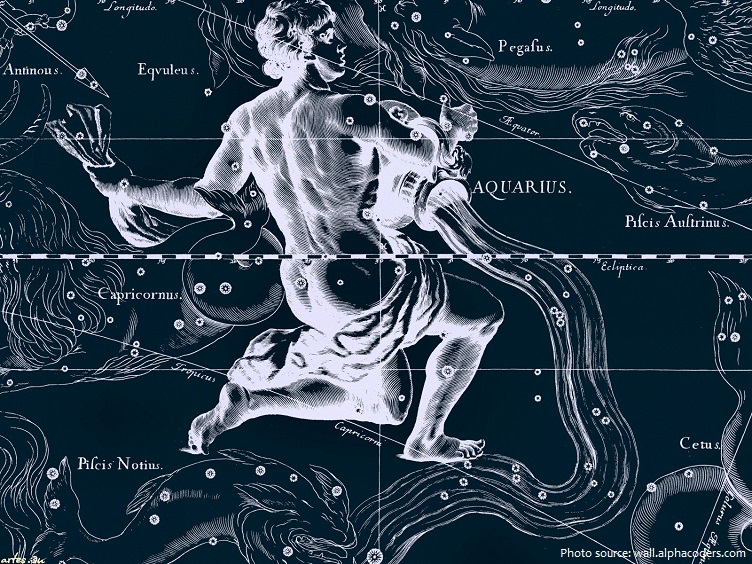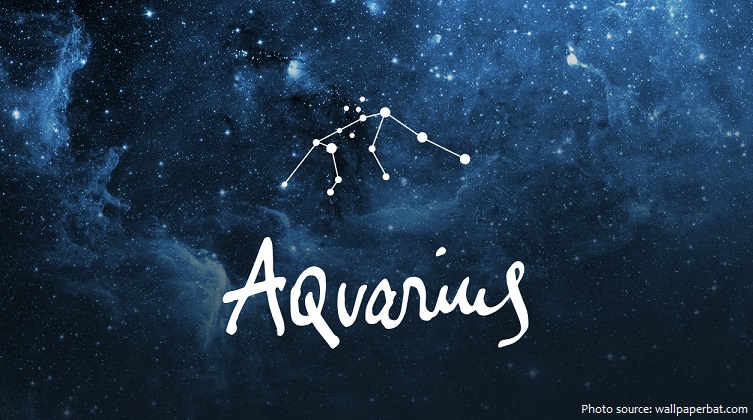
Aquarius is the eleventh astrological sign in the zodiac.
Aquarius is Latin for water-carrier.
Its symbol is ♒︎.
The traditional Western zodiac associates Capricorn with the period between January 21 and about February 20, and the sign spans the 300°–330° of celestial longitude.

Aquarius is one of the oldest of the recognized constellations along the zodiac (the Sun’s apparent path).
It was one of the 48 constellations listed by the 2nd century astronomer Ptolemy, and it remains one of the 88 modern constellations.
It is found in a region often called the Sea due to its profusion of constellations with watery associations such as Cetus the whale, Pisces the fish, and Eridanus the river.
The water carrier represented by the zodiacal constellation Aquarius is Ganymede, a beautiful Phrygian youth. Ganymede was the son of Tros, king of Troy (according to Lucian, he was also the son of Dardanus). While tending to his father’s flocks on Mount Ida, Ganymede was spotted by Zeus. The king of gods fell in love with him and flew down to the mountain in the form of a large bird, whisking Ganymede away to the heavens. Ever since, the boy has served as cupbearer to the gods. Ovid has Orpheus sing the tale.

Homer describes Ganymede as the most beautiful of mortals, abducted by the gods, to serve as Zeus’s cup-bearer in Olympus.
In the Greek tradition, the constellation came to be represented simply as a single vase from which a stream poured down to Piscis Austrinus. The name in the Hindu zodiac is likewise kumbha “water-pitcher”.
In the first century, Ptolemy’s Almagest established the common Western depiction of Aquarius. His water jar, an asterism itself, consists of Gamma, Pi, Eta, and Zeta Aquarii – it pours water in a stream of more than 20 stars terminating with Fomalhaut, now assigned solely to Piscis Austrinus. The water bearer’s head is represented by 5th magnitude 25 Aquarii while his left shoulder is Beta Aquari -; his right shoulder and forearm are represented by Alpha and Gamma Aquarii respectively.

In Chinese astronomy, the stream of water flowing from the Water Jar was depicted as the “Army of Yu-Lin”. The name “Yu-lin” means “feathers and forests”, referring to the numerous light-footed soldiers from the northern reaches of the empire represented by these faint stars.
Aquarians are known for embracing their creativity and individuality, even if it makes them stand out in a strange or unorthodox way from others. This quality tends to draw them toward anything fun and innovative. The most notable Aquarius characteristic is their lofty vision for their own future as well as the future of society. Aquarians are forward-thinking people who want to make the world a better place. Their acts and viewpoints are guided by their empathy and strong sense of fairness. They value freedom as well, and want to ensure that it is available to everyone.
Aquarius is also associated with the Age of Aquarius, a concept popular in 1960s counterculture. Despite this prominence, the Age of Aquarius will not dawn until the year 2597, as an astrological age does not begin until the Sun is in a particular constellation on the vernal equinox.

The Aquarius myth follows the story of Ganymede:
One day Ganymede was off tending to his father’s sheep in a grassy area on Mount Ida when he was spotted by Zeus (Greek mythology).
Zeus transformed himself into the shape of a giant eagle and swooped down from Mount Olympus to Mount Ida. He grabbed Ganymede in his talons and carried him back to Mount Olympus to be his young lover / servant. Now, normally in these kinds of relationships the older man would serve as a sort of mentor to the younger one, but this was Zeus, and he pretty much gets whatever he wants. So Zeus decides that Ganymede will become his personal cup-bearer, basically bringing him drinks whenever he pleases.
Since Ganymede is now essentially Zeus’s slave, Zeus offers Ganymede’s father a herd of the finest horses in the land as compensation for taking his son away. This apparently appeases the father, though it’s doubtful that he had much of a say in the matter either way.
One day Ganymede has had enough, and he decides to pour out all of the wine, ambrosia, and water of the gods, refusing to stay Zeus’s cup bearer any longer. The legend goes that the water all fell to Earth, causing inundating rains for days upon days, which created a massive flood that flooded the entire world.
At first Zeus wants to punish Ganymede, but in a rare moment of self-reflection, Zeus realizes that he has been a bit unkind to the boy, so he makes him immortal as the constellation representing the Aquarius myth.